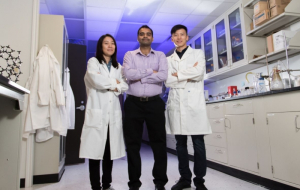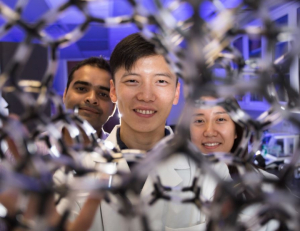Three Cullen College chemical engineering Ph.D. students have returned from Denver, Co. where they were special guests at the 25th North American Meeting (NAM25) of the North American Catalysis Society. Sashank Kasiraju, who studies under the direction of Assistant Professor Lars Grabow, Wendy Lang, who studies under Mike Harold, chair of chemical and biomolecular engineering and Wei Qin, mentored by Jeff Rimer, Ernest J. and Barbara M. Henley associate professor of chemical and biomolecular Engineering, were all Richard J. Kokes Travel Award winners, which allowed them access to the prestigious meeting and the opportunity to make presentations to the esteemed audience.
Their work with catalysts, substances that speed up reactions in all industries from petrochemical to manufacturing, was the catalyst for their awards.
Taking the oxygen out of renewable feedstock
Kasiraju uses computational modeling to work in the field of renewable energy, converting biomass (made of carbon, oxygen and hydrogen) into biofuels. He works specifically with the problem of reducing the oxygen content of bio-oil, which is a precursor to biofuels.
“The oxygen content of bio-oil is rather high, up to 40 weight percent,” said Kasiraju. “If you want to use it as drop-in replacement fuel in your car it has to be less than 1 percent.”
The oral presentation he gave at the conference, “Balancing the site requirements for hydrodeoxygenation of bio-oil over mixed molybdenum oxy-carbide phases,” speaks to the improved understanding of the process of using hydrogen to remove the oxygen.
His work, finding new materials for hydrodeoxygenation, is sponsored by the U.S. Department of Energy and comes at the right time as the U.S. consumption of coal continues in a freefall.
Ford Tough
Wendy Lang is revved up about cutting car emissions and creating better catalytic converters, which control emissions in vehicles. Ford is pretty excited about her work, too, and it’s sponsoring her research.
“We’re putting different materials into catalysts to see if we can get better performance,” said Lang, who is especially interested in the “cold start” of a vehicle – when the car is cold and hasn’t been running for several hours.
“When you turn on your engine there’s a short time window in which you emit harmful chemical species because the temperature just isn’t hot enough for the reactions to take place,” said Lang. She’s trying to create catalysts that perform better at lower temperatures, using substances like palladium, a cheaper substitute for platinum (which is inside catalytic converters) and a metal oxide called ceria, which stores oxygen.
Lang gave an oral presentation at the meeting.
Sponsored by Shell
Qin performs experiments with zeolites, which are crystals used as adsorbents and catalysts in a variety of chemical processes. The petrochemical industry commonly uses zeolites as catalysts because they efficiently speed up chemical reactions and can be produced relatively cheaply.
His work producing one of the most commonly used zeolites, made of silicon, aluminum and oxygen, is sponsored by Shell. Zeolite catalysts are widely used in different processes including refining, chemical production and emerging applications.
“Shell’s group came to us to see if we could improve the performance of their zeolite catalysts,” said Wei.
And he has.
“We have successfully altered the properties of zeolite crystals, leading to increased lifetime through improved molecular diffusion and reduced coking, the process that results in carbon deposition within zeolite pores that causes deactivation of the catalyst,” said Wei.
All three graduate students are honored to have won the award.
“It is probably the most important award a grad student could get in the field of catalysis,” said Kasiraju. “And the best part is you get to see all experts in this field in one place and you get almost exclusive access to interact with all of them.”
Lang added, “It’s really generous of them to sponsor students to travel to these conferences and this is one of the top conferences in our field to attend.”

